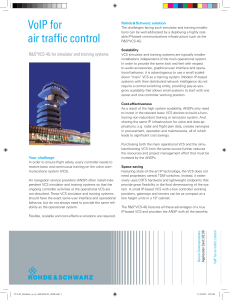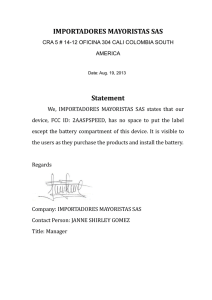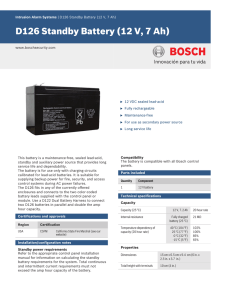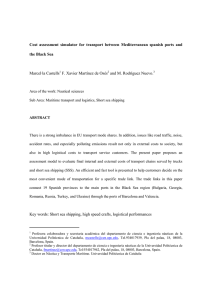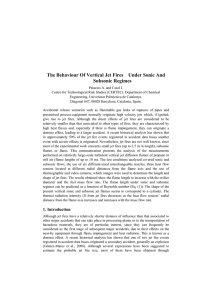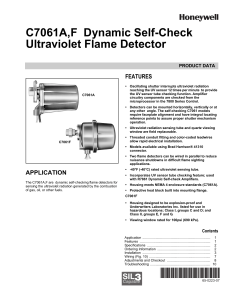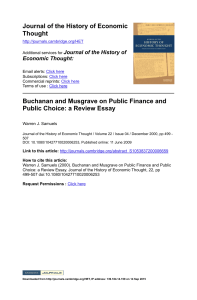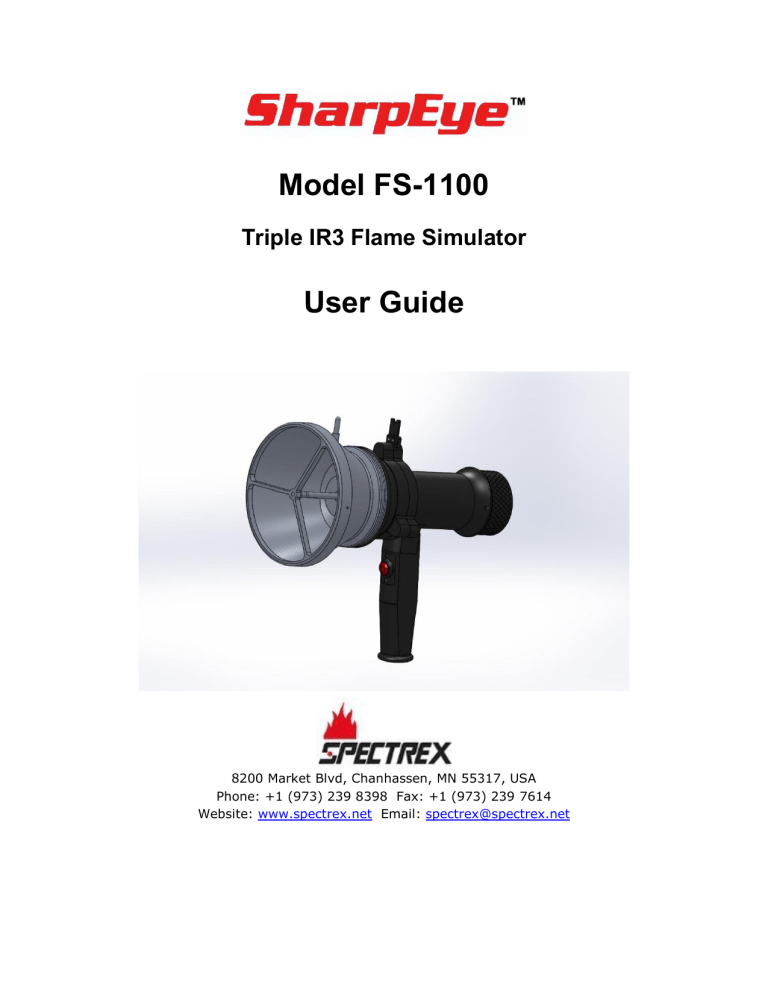
Model FS-1100 Triple IR3 Flame Simulator User Guide 8200 Market Blvd, Chanhassen, MN 55317, USA Phone: +1 (973) 239 8398 Fax: +1 (973) 239 7614 Website: www.spectrex.net Email: [email protected] Legal Notice and Warranty The SPECTREX SharpEye Optical Flame Detector described in this document is the property of Rosemount. No part of the hardware, software or documentation may be reproduced, transmitted, transcribed, stored in a retrieval system or translated into any language or computer language, in any form or by any means, without prior written permission of Rosemount. While great efforts have been made to assure the accuracy and clarity of this document, Rosemount assumes no liability resulting from any omissions in this document, or from misuse of the information obtained herein. The information in this document has been carefully checked and is believed to be entirely reliable with all of the necessary information included. Rosemount reserves the right to make changes to any products described herein to improve reliability, function, or design, and reserves the right to revise this document and make changes from time to time in content hereof with no obligation to notify any persons of revisions or changes. Rosemount does not assume any liability arising out of the application or any use of any product or circuit described herein; neither does it convey license under its patent rights or the rights of others. Warranty SPECTREX agrees to extend to Purchaser/Distributor a warranty on the SPECTREX supplied components of the SharpEye products. SPECTREX warrants to Purchaser/Distributor that the products are free from defects in materials and workmanship for a period of five (5) years, commencing with the date of delivery to Purchaser/Distributor. SPECTREX expressly excludes damage incurred in transit from the factory or other damage due to abuse, misuse, improper installation, or lack of maintenance or “Act of God” which are above and beyond its control. SPECTREX will, upon receipt of any defective product, transportation prepaid, repair or replace it at its sole discretion if found to have been defective when shipped. Said repair or replacement is SPECTREX’S sole liability under this warranty and SPECTREX’S liability shall be limited to repair or replacement of the component found defective and shall not include any liability for consequential or other damages. The customer is responsible for all freight charges and taxes due on shipments both ways. This warranty is exclusive of all other warranties express or implied. TM380002 Rev. (Aa), August 2017 Table of Contents Table of Contents ............................................................................................ v List of Figures ................................................................................................ vi List of Tables .................................................................................................. vi 1 2 3 About this Guide ........................................................................................ 7 1.1 Release History ...................................................................................... 8 1.2 Glossary and Abbreviations ..................................................................... 9 1.3 Notifications .........................................................................................10 Product Overview .................................................................................... 11 2.1 Model and Types ...................................................................................11 2.2 Features and Benefits ............................................................................12 2.3 Principles of Operation ...........................................................................12 2.4 Simulator Status ...................................................................................12 2.5 Product Certification ..............................................................................12 2.6 Simulator Structure ...............................................................................13 2.7 Certification Instructions ........................................................................15 2.7.1 General Instructions ........................................................................15 2.7.2 Special Conditions for Safe Use.........................................................16 Operation Instructions ............................................................................ 17 3.1 Ordering Information .............................................................................17 3.2 Unpacking ............................................................................................17 3.3 Operating Instructions ...........................................................................17 3.4 Detection Ranges ..................................................................................19 3.5 Charging the Battery .............................................................................20 3.6 Maintenance .........................................................................................21 3.7 Troubleshooting ....................................................................................22 3.8 Technical Specifications .........................................................................22 3.8.1 General Specifications .....................................................................22 3.8.2 Electrical Specifications....................................................................22 3.8.3 Physical Specifications .....................................................................23 3.8.4 EMI Compatibility ............................................................................23 Technical Support ......................................................................................... 26 TM380002 Rev. (Aa), August 2017 v List of Figures Figure 1: Flame Simulator Side View ...................................................................13 Figure 2: Flame Simulator Rear View ...................................................................14 Figure 3: Flame Simulator Front View ..................................................................14 Figure 4: Flame Simulator Battery Replacement ....................................................21 List of Tables Table 1: Flame Simulator Compatibility ................................................................18 Table 2: Detection Ranges per Detector/Flame Simulator .......................................19 vi SharpEye™ Triple IR3 Flame Simulator User Guide About this Guide 1 About this Guide This guide describes the SharpEye Flame Simulator and its features, and provides instructions on how to operate and maintain the simulator. Note: This user guide should be read carefully by all individuals who have or will have responsibility for using, maintaining, or servicing the product. This guide includes the following chapters: Chapter 1, About this Guide, details the layout of the guide, includes the release history, a glossary and abbreviations, and explains how notifications are used in the guide. Chapter 2, Product Overview, describes the SharpEye Flame Simulator and its features, and provides instructions on how to operate and maintain the simulator. Chapter 3, Operation Instructions, describes how to operate the simulator, including instructions regarding replacement and charging of the battery. TM380002 Rev. (Aa), August 2017 7 About this Guide 1.1 8 Release History Rev Date Revision History Prepared by Approved by 0 January 2014 First Release Ian Buchanan Eric Zinn 1 May 2014 Second Release Ian Buchanan Eric Zinn 2 October 2014 Third Release Ian Buchanan Eric Zinn 3 December 2014 Fourth Release Ian Buchanan Eric Zinn 4 January 2015 Fifth Release Ian Buchanan Eric Zinn 5 February 2015 Sixth Release Ian Buchanan Eric Zinn 6 March 2015 Seventh Release Ian Buchanan Eric Zinn 7 July 2015 Eighth Release Ian Buchanan Eric Zinn 8 December 2015 Ninth Release Ian Buchanan Eric Zinn 9 March 2016 Tenth Release Ian Buchanan Eric Zinn 10 May 2016 Eleventh Release Ian Buchanan Eric Zinn 11 July 2016 Twelfth Release Ian Buchanan Eric Zinn 12 January 2017 Thirteenth Release Jay Cooley Ian Buchanan 13 February 2017 Fourteenth Release Jay Cooley Ian Buchanan 14 February 2017 Fifteenth Release Jay Cooley Ian Buchanan 15 April 2017 Sixteenth Release Jay Cooley Shaul Serero Aa August 2017 Seventeenth Release Jay Cooley Shaul Serero SharpEye™ Triple IR3 Flame Simulator User Guide About this Guide 1.2 Glossary and Abbreviations Abbreviation/Term Meaning Analog Video Video values are represented by a scaled signal ATEX Atmosphere Explosives AWG American Wire Gauge BIT Built-In-Test CMOS Complementary Metal-Oxide Semiconductor image sensor Digital Video Each component is represented by a number representing a discrete quantization DSP Digital Signal Processing EMC Electromagnetic Compatibility EMI Electromagnetic Interference EOL End of Line FOV Field of View HART Highway Addressable Remote Transducer – communications protocol IAD Immune at Any Distance IECEx International Electro-Technical Commission Explosion IP Internet Protocol IPA Isopropyl Alcohol IR Infrared IR3 Refers to the 3 IR sensors in the VID JP5 Jet Fuel LED Light Emitting Diode MODBUS Serial communications protocol using Master-Slave messaging N/A Not Applicable N.C. Normally Closed NFPA National Fire Protection Association Normally Open N.O. NPT National Pipe Thread NTSC National Television System Committee (a color encoding system) TM380002 Rev. (Aa), August 2017 9 About this Guide 1.3 Abbreviation/Term Meaning PAL Phase Alternation by Line (a color encoding system) P/N Part Number RFI Radio Frequency Interference RTSP Real Time Streaming Protocol SIL Safety Integrity Level UNC Unified Coarse Thread VAC Volts Alternating Current Notifications This section explains and exemplifies the usage of warnings, cautions, and notes throughout this guide: Warning: This indicates a potentially hazardous situation that could result in serious injury and/or major damage to the equipment. Caution: This indicates a situation that could result in minor injury and/or damage to the equipment. Note: This provides supplementary information, emphasizes a point or procedure, or gives a tip to facilitate operation. 10 SharpEye™ Triple IR3 Flame Simulator User Guide Product Overview 2 Product Overview To comply with local standards and jurisdictional authorities, "end-to-end" loop testing of fire protection alarm systems, including detectors, should be performed periodically. Many safety authorities and plant managers of high-value/high-risk assets and facilities insist on quarterly "end-to-end" testing of their entire fire protection systems using an external flame simulator. SPECTREX flame simulators emit electromagnetic radiation in a unique sequential pattern corresponding to and recognizable as fire by specific SharpEye Flame Detector models. This allows for testing under real fire conditions without the associated risks of an open flame. SPECTREX flame simulators are ATEX certified EExd for use in hazardous zones 1, 2, 21, and 22, and are powered by rechargeable lithium-ion batteries. When fully charged, the flame simulator operates for at least 1,000 tests without recharging. Starting fires in hazardous locations is not permitted, and can be dangerous in non-hazardous locations. Using an external, portable SPECTREX flame simulator is the best means to perform a complete, functional "end-to-end" test of the detector and the fire protection system, without the need to start an actual fire. The SPECTREX flame simulator is the only non-hazardous and safe method to test the flame detector’s sensors, internal electronics, alarm activation software, cleanliness of the viewing window/lens, wiring integrity, actual relay activation, and proper functionality of any other outputs used (mA, RS-485, HART). Warning: The Simulator is not field-repairable due to the meticulous alignment and calibration of the emitter and the respective circuits. Do not attempt to modify or repair the internal circuits or change their settings, as this will impair the system's performance and void the SPECTREX product warranty. 2.1 Model and Types The FS-1100 Flame Simulator is compatible with several detector types: Simulator P/N Compatible with: Triple IR3 Flame Simulator FS-1100 40/40I, 40/40UFI, 20/20MI, 20/20MPI, 20/20CTIN/P TM380002 Rev. (Aa), August 2017 11 Product Overview 2.2 2.3 Features and Benefits Used for maintenance and testing of flame detectors Ability to activate the flame detector from a distance of up to 12m Rechargeable battery included Operates at least 1,000 tests before battery recharge is necessary Principles of Operation The FS-1100 emits IR energy, which is filtered to emit electromagnetic radiation in a unique sequential pattern, corresponding to and recognizable as a fire by the SharpEye IR3 Flame Detector. The simulator includes a reflector that accumulates the IR energy and directs it towards the detector. The FS-1100 includes a laser diode and a sight for guiding the simulator to the center of the flame detector. 2.4 Simulator Status During the first 5 seconds of operation, the laser defines the simulator’s status. Normal Status When switching to normal status, the laser beams for 5 seconds before IR radiation is activated. These 5 seconds are used to aim the simulator to the center of the detector before activating IR radiation. IR radiation is then activated for 50 seconds. After 50 seconds, IR radiation stops and the simulator cannot operate for 20 seconds (delay between activations). Fault Status 2.5 Low Battery – The laser flashes 3 times in 3 consecutive cycles. IR radiation will be activated. IR Fault – The laser flashes 3 times in 5 consecutive cycles. IR radiation will not be activated. Total Failure – The laser does not turn on. IR radiation will not be activated. Product Certification The Flame Simulator Model FS-1100 is certified to ATEX and IECEx: Ex II 2 G D Ex db ib op is IIB + H2 T5 Gb Ex ib op is tb IIIC T135°C Db –4°F to +122°F / –20°C to +50°C 12 SharpEye™ Triple IR3 Flame Simulator User Guide Product Overview The Flame Simulator Model FS-1100-R is certified per TR CU/EAC: 1Ex db ib op is IIB+H2 T5 Gb X Ex ib op is tb IIIC T135°C Db X -20°C ≤Ta ≤+50°C This product is suitable for use in hazardous zones 1, 2, 21, and 22 with IIB + H 2 gas group vapor present. 2.6 Simulator Structure The flame simulator is built from black-coated aluminum housing. It includes the following components: Reflector Electronic chambers Battery chamber Handle The electronic chamber includes a PC Board with an IR source or halogen lamp. The source or lamp is assembled on the PC Board and emits light through the sapphire window. The battery chamber includes a battery pack containing 4 lithium-ion batteries, measuring a total of 14.8VDC and 2.2Ah. The battery pack can be replaced easily by opening the back cover. This procedure must be executed in a safe area using only a SPECTREX battery pack, P/N 380004. Figure 1: Flame Simulator Side View TM380002 Rev. (Aa), August 2017 13 Product Overview Figure 2: Flame Simulator Rear View Figure 3: Flame Simulator Front View 14 SharpEye™ Triple IR3 Flame Simulator User Guide Product Overview 1 Electronic Chamber 6 Push Button 2 Battery Chamber 7 Sight 3 Battery Back Cover 8 Back Cover Locking Screw 4 Handle 9 Laser Diode 5 Reflector 2.7 Certification Instructions 2.7.1 General Instructions The equipment marking is defined as follows: Ex II 2 G D Ex db ib op is IIB + H2 T5 Gb Ex ib op is tb IIIC T135°C Db -20°C to +50°C / -4°F to +122°F The equipment may be used with flammable gasses and vapors with apparatus groups IIA and IIB+H2 T5 in the ambient temperature range of -4°F to +122°F / -20°C to +50°C. Inspection and maintenance of this equipment should be performed by suitable trained personnel, in accordance with the applicable code of practice, e.g. EN 60079-17. Repair of this equipment should be performed by suitable trained personnel, in accordance with the applicable code of practice, e.g. EN 60079-19. Certification of this equipment relies upon use of the following materials in its construction: Enclosure: Aluminum 6061T6 Window: Sapphire glass Seals: EPDM If the equipment is likely to come into contact with aggressive substances (described below), then it is the responsibility of the user to take suitable precautions (described below) to prevent the equipment from being adversely affected. This ensures that the type of protection provided by the equipment is not compromised. Examples of aggressive substances: acidic liquids or gases that may attack metals or solvents, or may affect polymeric materials. Examples of suitable precautions: routine inspections, establishing resistance to specific chemicals from the material’s data sheets. TM380002 Rev. (Aa), August 2017 15 Product Overview 2.7.2 Special Conditions for Safe Use The dimensions of the flameproof joints are other than the relevant minimum or maximum values required by Table 2 of IEC/EN 60079-1:2007 for IIB + H2, as detailed below: Flamepath Description Type of Joint Minimum Width “L” (mm) Maximum Gap “ic” (mm) Joint formed by window against the enclosure Flanged 10.75 0.02 Cylindrical 15 0.08 Enclosure end-cap spigot Gaps should not be machined to be any larger than the values of “ic,” and width should not be modified to be any smaller than the values of “L,” as shown in the table above. The equipment should only be charged in a safe area. Batteries must be removed from the flameproof enclosure. The charge conditions are as follows: Maximum charge voltage: 4.2V per cell Maximum charge current: 2200mA The charge voltage and current should not exceed these values. 16 SharpEye™ Triple IR3 Flame Simulator User Guide Operation Instructions 3 Operation Instructions 3.1 Ordering Information The P/N of the Flame Simulator Kit is 380114-1. The kit is supplied in a carry case that includes: 3.2 Flame Simulator FS-1100 Battery pack 380004 Charger Tool Kit Technical Manual TM380002 Unpacking Verify that you received the following components: 3.3 Delivery form Flame simulator with integral battery Battery charger Tool keys User manual FAT forms EC declaration Storage case Operating Instructions Warning: This indicates a potentially hazardous situation that could result in serious injury and/or major damage to the equipment. Caution: The following test simulates real fire conditions and may activate the extinguishing system or other alarms. If this is not desired, disconnect/inhibit them before the test and reconnect after simulation. TM380002 Rev. (Aa), August 2017 17 Operation Instructions 1 Verify you are using the correct simulator that fits the tested detector, per the following table: Table 1: Flame Simulator Compatibility 18 Simulator Compatible with: FS-1100 40/40I, 40/40UFI, 20/20MI, 20/20MPI, 20/20CTIN/CTIP 2 Verify you are at the correct distance from the detector according to the type of detector and the detector sensitivity (see Detection Ranges on page 19). 3 For FS-1100 – Using the mechanical sight, aim the flame simulator toward the center of the detector. Push the activate button; then use the laser spot for fine adjustment toward the center of the detector. 4 Keep the simulator aimed at the detector for up to 50 seconds until you trigger an alarm. 5 Wait 20 seconds before repeating the test. SharpEye™ Triple IR3 Flame Simulator User Guide Operation Instructions 3.4 Detection Ranges Table 2: Detection Ranges per Detector/Flame Simulator Model FS-1100 Detector Types 40/40I, 20/20CTIx 40/40UFI 20/20MPI 20/20MI-1 20/20MI-3 Detector Sensitivity Setting (ft/m) Testing Distance (ft/m) 50/15 6.6/2 100/30 19.6/6 150/45 29.5/9 215/65 39.3/12 66/20 13/4 133/40 26/8 200/60 40/12 300/90 50/15 33/10 6.6/2 65/20 8.2/2.5 100/30 19.6/6 132/40 26.2/8 33/10 N/A 65/20 8.2/2.5 100/30 19.6/6 132/40 26.2/8 N/A Notes: The minimum distance from the detector is 30”/75cm. At extreme temperatures there is a 15% reduction in the testing range. Warning: Keep the flame simulator in a safe place when not in use. TM380002 Rev. (Aa), August 2017 19 Operation Instructions 3.5 Charging the Battery The flame simulator uses lithium-ion batteries as a rechargeable power source. When the batteries are fully charged, the simulator operates at least 1,000 times without recharging. When the voltage from the batteries is lower than the required operational level, the simulator will not operate. To Charge the Battery: 1 Place the flame simulator on a table in a safe area, not exceeding 104°F/40°C. 2 Release the locking screw (Figure 1, Item 8). 3 Unscrew the battery back cover counterclockwise (Figure 1 and Figure 4, Item 3). 4 Unscrew the locking disc clockwise (Figure 4, Item 4). 5 Pull out the battery from the flame simulator (Figure 4, Item 2). 6 Connect the battery to the charger. Verify that the charger is supplied with the flame simulator model FRIWO MPP15, with maximum charging voltage of 16.8V (4.2V x 4) and maximum current of 700mA. 7 Charge for a maximum of 2–3 hours, until the green LED on the charger lights. 8 Disconnect the charger. 9 Insert the battery into the flame simulator (Figure 4, Item 2). 10 Screw on the locking disc (Figure 4, Item 4). 11 Screw on the back cover (Figure 1 and Figure 4, Item 3). 12 Lock the back cover with the locking screw (Figure 1, Item 8). To Replace the Battery: 20 1 Place the flame simulator on a table in a safe area, not exceeding 104°F/40°C. 2 Release the locking screw (Figure 1, Item 8). 3 Unscrew the battery back cover counterclockwise (Figure 1 and Figure 4, Item 3). 4 Unscrew the locking disc clockwise (Figure 4, Item 4). 5 Pull out the battery from the flame simulator (Figure 4, Item 2). 6 Insert the new battery pack in the simulator housing. Use only a SPECTREX battery pack, P/N 380004. 7 Screw on the locking disc (Figure 4, Item 4). 8 Screw on the back cover (Figure 1 and Figure 4, Item 3). 9 Lock the back cover with the locking screw (Figure 1, Item 8). SharpEye™ Triple IR3 Flame Simulator User Guide Operation Instructions 1 Simulator 2 Battery Pack 3 Back Cover 4 Locking Disc Figure 4: Flame Simulator Battery Replacement 3.6 Maintenance Ensure the flame simulator is charged before operation. Ensure the reflector and window are clean. Before replacing the battery, check that you have a SPECTREX Battery Pack, P/N 380004. When the simulator is not in use, recharge at least every 6 months. Warning: Use only a SPECTREX Replacement Battery Pack, P/N 380004. TM380002 Rev. (Aa), August 2017 21 Operation Instructions 3.7 Troubleshooting Model FS-1100 Problem Solution Laser flashes 3 times 1. Recharge the battery. Laser flashes 5 times 1. Operate the flame simulator again. 2. Send the flame simulator for repair. Laser does not turn on 1. Recharge the battery. 2. Replace the battery. 3. Send the flame simulator for repair. Flame simulator seems to work properly but does not activate the detector 1. Verify that you are at the correct distance. 2. Verify that the flame detector is at the correct sensitivity. 3. Verify that the flame detector is operating. 4. Verify that the flame detector is clean. 3.8 Technical Specifications 3.8.1 General Specifications Temperature Range: -4°F to +122°F / -20°C to +50°C Vibration Protection: 1g (10–50Hz) 3.8.2 Electrical Specifications Power: 14.8V (4 x 3.7V rechargeable lithium-ion battery) Max. Current: 0.2A Battery Capacity: 2.2Ah Charging Time: 2hr at 2A 22 SharpEye™ Triple IR3 Flame Simulator User Guide Operation Instructions 3.8.3 Physical Specifications Dimensions: 9” x 7.3” x 5.35” / 230 x 185 x 136 mm Weight: 5.5lb/2.5kg Enclosure: Aluminum, heavy duty copper free, black zinc coating. Explosion proof enclosure: ATEX and IECEx Ex II 2 G D Ex db ib op is IIB + H2 T5 Gb Ex ib op is tb IIIC T135°C Db -20°C to +50°C / -4°F to +122°F TR CU/EAC 1Ex db ib op is IIB+H2 T5 Gb X Ex ib op is tb IIIC T135°C Db X -20°C ≤ Ta ≤ +50°C Water and Dust Tight: IP65 3.8.4 EMI Compatibility Immunity Tests Title Basic Standard Level to be tested Electrostatic Discharge (ESD) IEC 61000-4-2 6kV/8kV contact/air Radiated Electromagnetic Field IEC 61000-4-3 20V/m (80MHz–1GHz) 10V/m (1.4–2GHz) 3V/m (2.0–2.7GHz) Conducted Disturbances IEC 61000-4-6 10 Vrms (150kHz–80MHz) Immunity to Main Supply Voltage Variations MIL-STD-1275B Emission Tests Title Radiated Emission Basic Standard Level to be Tested IEC 61000-6-3 40dbuv/m (30–230MHz), 47dbuv/m (230MHz–1GHz) TM380002 Rev. (Aa), August 2017 Class Like Class B of EN 55022 23 Technical Support For technical assistance or support, contact: 8200 Market Blvd Chanhassen, MN 55317 USA Phone: +1 (973) 239 8398 Fax: +1 (973) 239 7614 Email: [email protected] Website: www.spectrex.net Your Local SPECTREX Office: Texas (USA) Mr. Jay Cooley, Regional Sales Manager 16203 Park Row, Suite 150 Houston, Texas 77084 USA Phone: +1 (832) 321 5229 Email: [email protected] Far East Mr. Deryk Walker, Regional Sales Manager 59 Fen Ji Hu, Danshui Taipei County 25163 Taiwan (ROC) Phone: +886 2 8626 2893 Mobile: +886 926 664 232 Email: [email protected]
